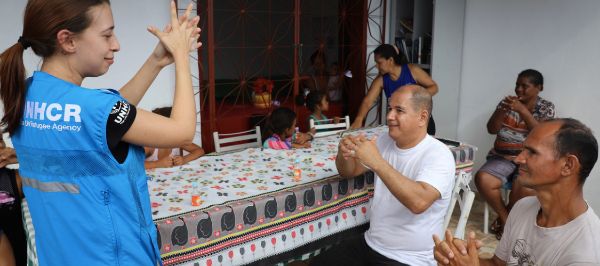UN Refugee Agency ‘rapidly Adjusting’ The Way It Works Amid COVID-19 Pandemic

With COVID-19 already having a significant impact on its field operations, the UN refugee agency (UNHCR) has outlined a series of measures it is taking to respond to the public health emergency and prevent further spread.
“I am deeply concerned at this unprecedented pandemic and its impact on refugees and their host communities,” said UN High Commissioner for Refugees Filippo Grandi, adding that the agency has been forced to rapidly adjusting the way it works, while “sparing no effort to help and protect refugees the best we can under these difficult circumstances.’’
“Our top priority in the COVID-19 crisis is to ensure that the people we serve are included in response plans and are properly informed, while we supplement governments’ preparedness and response efforts wherever needed.”
Among the measures UNHCR is taking are those to reinforce health and ‘WASH’ systems – for water, sanitation and hygiene – distributing soap and increasing water access. The agency is supporting governments in their infection prevention and healthcare response by providing medical equipment and supplies, distributing shelter material and core relief items, and offering guidance on prevention measures.
It is also expanding cash assistance to help mitigate the negative socioeconomic impact of COVID-19, Mr. Grandi said on Tuesday, and enhancing monitoring interventions to ensure the rights of forcibly displaced people are respected.
Although the number of reported and confirmed cases of COVID-19 infection among refugees remains low, over 80 per cent of the world’s refugee population – and nearly all the internally displaced people (IDPs) – live in low to middle-income countries, where health, water and sanitation systems are often weaker and need urgent support.
Many refugees also live in densely populated camps or in poorer urban areas, making prevention in these locations of paramount importance.
Prevention measures key in high-density camps, urban areas
Describing specific country efforts, Mr. Grandi said that in Bangladesh, UNHCR is training staff in health facilities serving Rohingya camps, where 850,000 refugees live in dense conditions. More than 2,000 refugee volunteers are working with community and religious leaders to communicate important prevention measures.
In Greece, UNHCR has stepped up support to authorities to increase water and sanitation capacity, deliver hygiene items, and establish and furnish medical units for screening, isolation and quarantine.
In Jordan, meanwhile, temperature screening is being conducted at entrances of the Zaatari and Azraq refugee camps, while handwashing and temperature screening facilities have been set up at entry points, transit centres and health facilities in both Ethiopia and Uganda.
In Brazil, UNHCR and its partners established an isolation area in Boa Vista to host possible suspected cases among Venezuelan refugees.
Efforts are also underway in Sudan, where UNHCR has delivered soap to over 260,000 refugees, internally displaced people and members of the host communities. Along with other UN agencies and Sudan’s Ministry of Health, it is running a massive awareness campaign in several languages.
Prevention measures have also been put in place in refugee camps and IDP sites in the Democratic Republic of the Congo and Burkina Faso.
More broadly, UNHCR is working with UN partners to find solutions to logistical challenges resulting from disrupted manufacturing capacity and border closures. This includes stepping up local and regional procurement and organizing air bridges, said Mr. Grandi, noting that over 100 tonnes of emergency and medical aid were recently airlifted to Chad and Iran.
On 26 March, UNHCR called for $255 million as part of the wider UN appeal, to focus on priority countries that will require specific action.
“We will continue to expand our critical interventions on the ground. But to do this, we need timely and unearmarked financial support now, including to ongoing humanitarian operations,” Mr. Grandi stressed. “Coordinated international support is in our common interest and absolutely critical.”


 New Zealand Defence Force: New Zealand-Led Task Force Makes $NZ375-million Drug Bust In The Middle East
New Zealand Defence Force: New Zealand-Led Task Force Makes $NZ375-million Drug Bust In The Middle East ICHRP: ICHRP Welcomes Duterte’s Arrest - A Landmark Step Towards Justice
ICHRP: ICHRP Welcomes Duterte’s Arrest - A Landmark Step Towards Justice UN High Commissioner for Human Rights: Philippines - Türk Says Arrest Of Former President Duterte Is Important Step Toward Accountability
UN High Commissioner for Human Rights: Philippines - Türk Says Arrest Of Former President Duterte Is Important Step Toward Accountability Professional Footballers Australia PFA: PFA Partners With UK’s ‘The Great Save’ To Reduce Football Kit Waste
Professional Footballers Australia PFA: PFA Partners With UK’s ‘The Great Save’ To Reduce Football Kit Waste Doctors Without Borders: Israeli Authorities Must Stop Collective Punishment Of Palestinians And Use Of Aid As A Tool Of War
Doctors Without Borders: Israeli Authorities Must Stop Collective Punishment Of Palestinians And Use Of Aid As A Tool Of War RNZ: New Child Sex Offence Charges For Disgraced Businessman Ron Brierley
RNZ: New Child Sex Offence Charges For Disgraced Businessman Ron Brierley